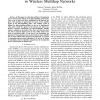Free Online Productivity Tools
i2Speak
i2Symbol
i2OCR
iTex2Img
iWeb2Print
iWeb2Shot
i2Type
iPdf2Split
iPdf2Merge
i2Bopomofo
i2Arabic
i2Style
i2Image
i2PDF
iLatex2Rtf
Sci2ools
143
click to vote
GLOBECOM
2010
IEEE
2010
IEEE
Queue-Stability-Based Transmission Power Control in Wireless Multihop Networks
In this paper, we study the problem of transmission power control and its effects on the link-scheduling performance when a set of end-to-end flows established in the network are given. This problem is approached by means of the stability region of the link-scheduling policy. The stability region is defined for link-scheduling policies as the set of input-packet rates under which the queues in the network are stable (i.e., positive recurrent). Specifically, the link-scheduling's stability region is adapted to the paths of the flows such that the flows are able to support higher levels of data traffic under lower levels of end-to-end delay. To the best of our knowledge, the approach of transmission power control based on queue stability has not been studied before. Based on this approach, we propose a transmission-power-control algorithm. It is shown, by means of simulation, that the algorithm outperforms the transmission power control based on spatial reuse.
Related Content
| Added | 11 Feb 2011 |
| Updated | 11 Feb 2011 |
| Type | Journal |
| Year | 2010 |
| Where | GLOBECOM |
| Authors | Gustavo Vejarano, Janise McNair |
Comments (0)

